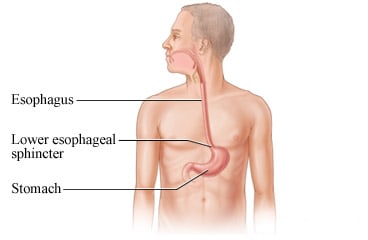
Your Care Instructions
The esophagus is the tube that carries food from your mouth to your stomach. An esophageal spasm is when the muscles along the esophagus tighten in an irregular, painful way. Normally, the esophagus tightens in a coordinated manner to move food along and into the stomach. An esophageal spasm can prevent food from getting to the stomach. This leaves it stuck in the esophagus.
The cause of esophageal spasm is not known, although it is more common in people who have gastroesophageal reflux disease (GERD). In some people, very hot or very cold foods can trigger a spasm.
Follow-up care is a key part of your treatment and safety. Be sure to make and go to all appointments, and call your doctor if you are having problems. It's also a good idea to know your test results and keep a list of the medicines you take.
How can you care for yourself at home?
- Be safe with medicines. Take your medicines exactly as prescribed. Call your doctor if you think you are having a problem with your medicine. You will get more details on the specific medicines your doctor prescribes.
- Treat other conditions that can make esophageal spasms worse, such as GERD.
- To treat GERD:
- Your doctor may recommend an over-the-counter medicine. For mild or occasional indigestion, it may help to take antacids, such as Tums, Mylanta, or Maalox. Be careful when you take over-the-counter antacid medicines. Many of these medicines have aspirin in them. Read the label to make sure that you are not taking more than the recommended dose. Too much aspirin can be harmful.
- Your doctor also may recommend over-the-counter acid reducers, such as famotidine (Pepcid AC), cimetidine (Tagamet HB), or omeprazole (Prilosec).
- Eat several small meals instead of two or three large meals.
- After you eat, wait 2 to 3 hours before you lie down.
- Avoid foods that make your symptoms worse. These may include chocolate, mint, alcohol, pepper, spicy foods, high-fat foods, or drinks with caffeine in them, such as tea, coffee, colas, or energy drinks. If your symptoms are worse after you eat a certain food, you may want to stop eating it to see if your symptoms get better.
- Try to quit smoking or chewing tobacco, or cut back as much as you can. If you need help quitting, talk to your doctor about quit-tobacco programs and medicines. These can increase your chances of quitting for good.
- If you have GERD symptoms at night, raise the head of your bed 6 to 8 inches. You can do this by putting the frame on blocks. Or you can place a foam wedge under the head of your mattress. (Adding extra pillows does not work.)
- Do not wear tight clothing around your middle.
- Lose weight if you need to. Losing just 5 to 10 pounds can help.
- Ask your doctor about relaxation and controlled breathing exercises. These may help reduce symptoms.
- Avoid very hot or cold foods if they trigger esophageal spasms.
When should you call for help?
Call 911 anytime you think you may need emergency care. For example, call if:
- You passed out (lose consciousness).
- You vomit blood or what looks like coffee grounds.
- You pass maroon or very bloody stools.
- You have severe belly pain.
Call your doctor now or seek immediate medical care if:
- You have new or worse belly pain.
- Your stools are black and look like tar or have streaks of blood.
Watch closely for changes in your health, and be sure to contact your doctor if:
- You are vomiting.
- You have new or worse symptoms of indigestion.
- You have trouble or pain swallowing.
- You are losing weight.
- You do not get better as expected.
Where can you learn more?
Go to http://www.healthwise.net/patientEd
Enter T207 in the search box to learn more about "Esophageal Spasm: Care Instructions".
Current as of: October 19, 2024
Author: Ignite Healthwise, LLC Staff
Clinical Review Board
All Ignite Healthwise, LLC education is reviewed by a team that includes physicians, nurses, advanced practitioners, registered dieticians, and other healthcare professionals.

